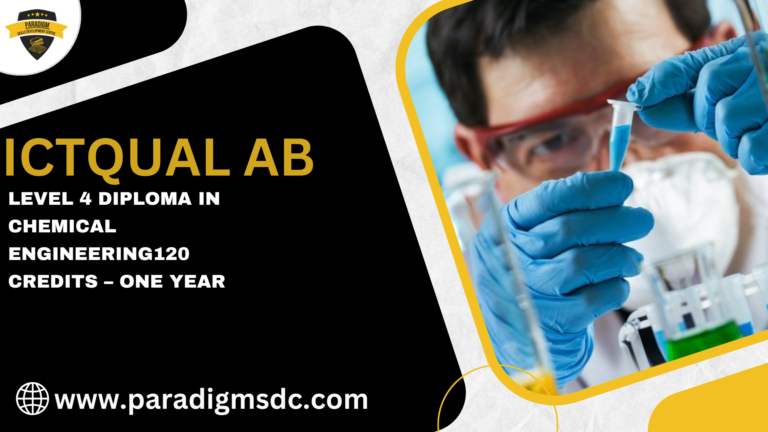Course Introduction
The ICTQual Level 3 Award in Phlebotomy: Basic Principles and Practices is a comprehensive training program designed for individuals seeking to develop foundational skills in phlebotomy. This course provides essential knowledge and hands-on training for safely and effectively drawing blood samples, which is a crucial skill in many healthcare settings. Participants will learn the principles of phlebotomy, including patient preparation, specimen collection, and infection control practices.
Course Overview
This award-level course offers a detailed exploration of phlebotomy, focusing on both theoretical knowledge and practical techniques. Participants will gain a deep understanding of the procedures involved in blood collection, the importance of proper technique, and the various tools and equipment used in phlebotomy. The course combines classroom instruction with practical exercises to ensure that learners are well-prepared for real-world applications.
Course Study Units
- Introduction to Phlebotomy
- Phlebotomy Techniques
- Infection Control in Phlebotomy
- Quality Assurance in Phlebotomy
- Ethical and Legal Issues in Phlebotomy
Learning Outcomes
By the end of this course, participants will:
Introduction to Phlebotomy
- Understanding of Phlebotomy:
- Define phlebotomy and its importance in healthcare.
- Explain the role of a phlebotomist within the healthcare team.
- Describe the ethical and professional responsibilities of a phlebotomist.
- Basic Anatomy and Physiology:
- Identify the major veins and arteries used in venipuncture.
- Explain how the circulatory system functions with blood collection.
- Recognize potential complications related to venipuncture and their management.
- Patient Communication and Care:
- Demonstrate effective communication skills with patients during blood collection.
- Explain strategies for managing patient anxiety and discomfort during phlebotomy procedures.
- Describe methods for ensuring patient safety and dignity during blood collection.
Phlebotomy Techniques
- Venipuncture Techniques:
- Prepare equipment and select appropriate veins for venipuncture.
- Demonstrate correct needle insertion and blood collection techniques.
- Explain post-procedure care and documentation requirements.
- Capillary Puncture Techniques:
- Identify appropriate sites for capillary puncture in various patient populations.
- Perform capillary puncture procedures safely and accurately.
- Compare and contrast capillary puncture versus venipuncture techniques.
Infection Control in Phlebotomy
- Principles of Infection Control:
- Describe the importance of infection control measures in phlebotomy.
- Demonstrate proper hand hygiene techniques and use of personal protective equipment (PPE).
- Implement procedures for cleaning and disinfecting phlebotomy equipment.
- Prevention of Needlestick Injuries:
- Identify potential hazards associated with phlebotomy procedures.
- Describe strategies for preventing needlestick injuries and exposure to bloodborne pathogens.
- Explain protocols for managing exposure incidents and reporting procedures.
Quality Assurance in Phlebotomy
- Specimen Collection and Handling:
- Demonstrate accurate techniques for specimen collection, labeling, and transportation.
- Describe factors that can affect specimen integrity and test results.
- Implement quality control measures to ensure the reliability of laboratory tests.
- Documentation and Record-Keeping:
- Maintain accurate records of phlebotomy procedures and patient information.
- Explain the importance of documenting procedural details and patient interactions.
- Demonstrate compliance with regulatory requirements for record-keeping in healthcare settings.
Ethical and Legal Issues in Phlebotomy
- Patient Rights and Confidentiality:
- Identify ethical principles governing patient care and consent in phlebotomy.
- Describe legal considerations related to patient confidentiality and privacy.
- Explain procedures for obtaining informed consent and respecting patient autonomy.
- Professional Standards and Accountability:
- Demonstrate adherence to professional standards of conduct and ethical behavior.
- Identify potential ethical dilemmas in phlebotomy practice and propose solutions.
- Discuss the role of professional organizations and regulatory bodies in maintaining standards of practice.
Course Benefits
- Enhanced Skills: Acquire essential phlebotomy skills that are critical for various healthcare roles.
- Patient Care: Improve your ability to provide compassionate and effective care during blood collection procedures.
- Career Opportunities: Open doors to career opportunities in hospitals, clinics, diagnostic labs, and other healthcare settings.
- Practical Experience: Gain hands-on experience with blood collection techniques and procedures.
Who is this Course For?
This course is ideal for:
- Healthcare professionals, including nurses, medical assistants, and laboratory technicians, who need to acquire or enhance their phlebotomy skills.
- Individuals pursuing a career in phlebotomy or related fields, such as laboratory technology or healthcare support.
- Current phlebotomists seeking to update their skills and knowledge with current best practices.
- Students and trainees in healthcare programs who require practical phlebotomy training.
Future Progression
After completing the ICTQual Level 3 Award in Phlebotomy: Basic Principles and Practices, participants can advance their careers by:
- Pursuing specialized certifications in phlebotomy or related areas, such as Certified Phlebotomy Technician (CPT) or Advanced Phlebotomy Certification.
- Gaining experience and seeking roles with increased responsibility in clinical laboratories, hospitals, or specialty clinics.
- Continuing education in healthcare fields related to laboratory technology, medical diagnostics, or patient care.
- Exploring opportunities for professional development in areas such as blood bank technology or clinical research.
The ICTQual Level 3 Award in Phlebotomy: Basic Principles and Practices is an essential qualification for those looking to excel in the field of phlebotomy. By mastering these fundamental skills, participants can contribute to high-quality patient care, ensure accurate diagnostic testing, and advance their careers in healthcare.







